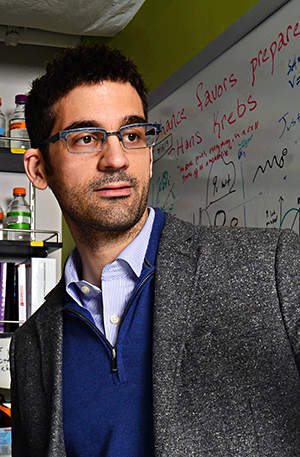The Alfred P. Sloan Foundation announced Feb. 17 that Washington University in St. Louis’ Gary Patti has been awarded a 2014 Sloan Research Fellowship.
He is among 126 outstanding U.S. and Canadian researchers selected as
fellowship recipients this year. Awarded annually since 1955, the
fellowships are given to early-career scientists and scholars whose
achievements and potential identify them as rising stars, the next
generation of scientific leaders.

“For more than half a century, the Sloan Foundation has been proud to honor the best young scientific minds and support them during a crucial phase of their careers when early funding and recognition can really make a difference,” said Paul L. Joskow, PhD, president of the Alfred P. Sloan Foundation. “These researchers are pushing the boundaries of scientific knowledge in unprecedented ways.”
” I am pleased and excited that Gary has been named a Sloan Fellow,” said William Buhro, PhD, professor and chair of chemistry in Arts & Sciences. “Patti is a pioneer in the rapidly developing field of metabolomics, in which the wide arrays of small-molecule metabolites in biological systems are profiled. Metabolomics presents a massive data-analysis challenge, to which Gary is contributing new technologies. He is also applying his new metabolomics technologies to study the biochemistry of disease states, which will advance medical therapies.”
“The goal of metabolomics is to take a urine, blood or tissue sample, analyze it with an instrument called a mass spectrometer, and acquire a complete profile of all of the small molecules in the sample,” said Patti, PhD, assistant professor in the departments of chemistry, genetics and medicine. The profile might reveal whether the sample donor is ill, at risk of developing a disease, has been exposed to a toxin, or is unable to tolerate a drug therapy.
Metabolomics already has provided unparalleled insight into previously opaque illnesses, such as chronic pain. “We identified a molecule that, prior to our studies, was not known to be a naturally occurring compound. We have demonstrated that this molecule is an important player in mediating chronic pain, and this has opened up new avenues for therapies that could help millions of people,” Patti said.
His lab is also hot on the trail of sarcopenia, the muscle wasting that occurs in some elderly patients and leads to “frailty” that has resisted scientific inquiry in the past. They identified six small molecules associated with aging in Caenorhabditis elegans, a worm that scientists use as a model system. Two of these compounds change as a function of age in healthy human skeletal tissue and may be involved in sarcopenia. In the meantime, the group is establishing a library of metabolite levels in long-lived model organisms.
Past Sloan Research Fellows include physicist Richard Feynman and game theorist John Nash. Since the beginning of the program in 1955, 42 fellows have received a Nobel Prize in their respective field, 16 have won the Fields Medal in mathematics, 13 have won the John Bates Clark Medal in economics, and 63 have received the National Medal of Science.
Scientists in eight scientific and technical fields — chemistry, computer science, economics, mathematics, evolutionary and computational molecular biology, neuroscience, ocean sciences and physics — are eligible for the awards.
The fellowships are awarded through close cooperation with the scientific community. Candidates must be nominated by their fellow scientists, and winning fellows are selected by an independent panel of senior scholars on the basis of a candidate’s independent research accomplishments, creativity, and potential to become a leader in his or her field.
The Alfred P. Sloan Foundation is a philanthropic, nonprofit grant-making institution based in New York. Established in 1934 by Alfred Pritchard Sloan Jr., then-president and CEO of General Motors Corp., the foundation makes grants in support of original research and education in science, technology, engineering, mathematics and economic performance.